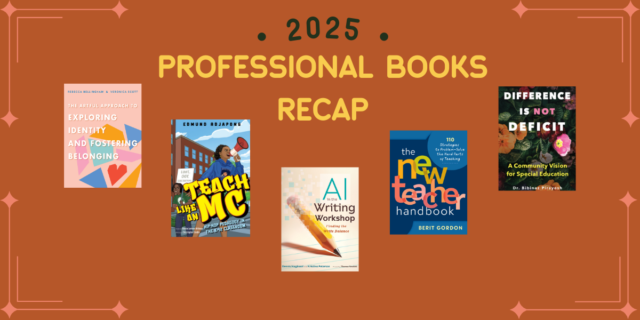
The following is adapted from Berit Gordon's The New Teacher Handbook.
Help! The tears are welling during class. What do I do?
First, know that almost every teacher has cried at some point. If lucky, we made it to the bathroom during our prep or went through a box of tissues on the drive home. When nothing seems right during class, you may want to break down, call your mom, or run for the hills. You’re not alone.
Try one of these tactics to stabilize those big (and expected) emotions and to get through the rest of the class in one piece.
- If tears are about to come, try one of these:
- Push your tongue to the roof of your mouth, which can stop the crying.
- Take a big, slow breath. Make the exhale longer than the inhale.
- Look out a window to anything in the distance or on the horizon.
- If you have your acting chops on, grab a tissue, fake a sneeze, and rub those eyes well. Those darn allergies! Turn away and focus on the tiniest detail of a poster or ceiling tile until you feel calmer.
- Put on a short video, or have the kids start or keep practicing any task from today’s lesson or yesterday’s. Don’t worry if they’re a little confused. You’re buying yourself a minute to regroup.
- If you cry in front of students, acknowledge it briefly, reassure them you are still a trustworthy adult in charge, and then move on.
What if I’m at a Breaking Point?
Oh, love. You’re in a rough spot. It’s hard to care about teaching and wanting a solid first year when life doesn’t go as planned. Now, it’s time to make some moves so you can feel better and your students don’t suffer.
- First, determine if this is an isolated rough stretch in an otherwise OK year or if you’ve been steadily struggling (in life or school) and are unsure if you can continue. If it’s been over a couple of weeks and things are unlikely to change, go to steps 4–6. If you’ve been generally OK until this dip, have support systems in place, and there’s an end point (like the end of a semester), start with steps 2–4.
- Comply, but be a C student for any tasks that are not in the service of students. This isn’t forever—just to get you to the other side of this tough time.
- Take a hard look at your calendar and cut any nonessential items for the next week or two. Have a coach or trusted friend help you ruthlessly eliminate tasks and events so you can prioritize rest.
- Go to at least two people you trust and ask for specific help—a meal or two, laundry, dog walking, whatever gives you a much-needed break. Asking for help doesn’t come naturally to those of us in a helping profession, but it strengthens bonds with others.
- Find a therapist who takes your insurance. They’ll help you with problem-solving, developing coping skills, and determining the next steps.
- Go to an administrator you trust and let them know you are struggling. It is often not apparent to them in their busy (and overwhelming) day. Any decent administrator wants to help you. If this doesn’t work, see the next step.
- It is rare, but if you are in a school with a punitive culture toward teachers and students, a laser focus on test scores, and multiple new curricula or initiatives pushed through with little to no support, focus on getting through while being kind to yourself and your students in the process. If you have a union rep, find them. They may have advice, and you’ll feel less alone. When you have the energy to consider your next steps, look at other schools before leaving the profession. Healthy school environments are out there.

What if I Yell at or was Mean to a Student?
In my first year, I laughed about my childhood goal of being a cleaning woman. A student whispered, “My mom is a cleaning lady.” To this day, I regret not going to her sooner and working harder to repair that harm. If you regret something you said to students or how you said it, immediately take action to fix the situation.
- Give an authentic apology to the class, group, or individual who was on the receiving end:
- Acknowledge what happened. Do not excuse your outburst or try to explain. Own that your words and tone were inappropriate, undeserved, or possibly frightening and that it is your job always to be a calm and caring adult.
- Briefly describe what you will do next time.
- Move on. Offer to speak with anyone privately who wants to discuss it more.
- Keep the apology to a sentence or two. Any more may confuse students who didn’t read much into it or have already moved on. Plus, they’re looking to you to show them you’re now calm and focused on teaching them.
- Practice the specific action you will use to get ahead of it next time before you are at the end of your rope. Don’t wait for the actual next time.
Keep checking back for more tips for new teachers!



